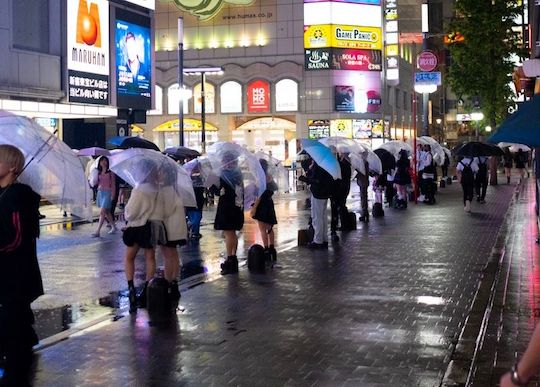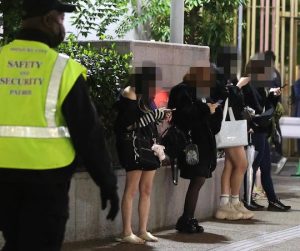Drugs, prostitution, and more: Police crackdown on Toyoko kids delinquency in Kabukicho continues
The police crackdown continues on the phenomenon known as Toyoko kids, referring to the young delinquents gathering in the main plaza in Kabukicho at night.
Delinquency in Shinjuku’s Kabukicho is absolutely nothing new but the current issue was sparked, in part, by the pandemic and is spatially different now, with young people gathering in one main location and the optics at nighttime contrasting with the “clean” Kabukicho.
The crackdown is linked to the attempts to gentrify Kabukicho and turn it into a tourist-friendly destination, even at night, which is ongoing for several years, and the more recent moral panic about prostitution in nearby Okubo Park by young women, often to pay off their debts to host clubs in Kabukicho.
Over the recent three-day weekend, police did a sweep of the Toyoko kids in Kabukicho, admonishing 21 young men and women aged between 14 and 17.

Officers checked for overdoses and if the teenagers were being involved in criminal acts by “malicious” adults.
As dutifully reported in the mainstream media, police announced that they admonished nine people for “late-night loitering” and a further eight for smoking. A 15-year-old high schooler had 20 sleeping pills, allegedly in order to overdose, and a 16-year-old high schooler was caught trying to enter a love hotel with a male customer who she picked up in Okubo Park.
Instances of police catching minors with drugs in Kabukicho has increased by three times.
On Friday night, police arrested a 44-year-old man for possession of dried cannabis on a rooftop of Kabukicho. He is alleged to have made female junior high school Toyoko kids smoke cannabis. The rooftop where he was arrested is another place where underaged kids gather.
Also in the news, six Kabukicho hosts and scouts have been arrested for introducing a 19-year-old female customers to sex work. Kabukicho’s hosts are essentially serving as go-betweens between vulnerable, indebted women and brothels or other sex services.
In another incident reported about a week ago, three men were arrested for separately soliciting sex from an 11-year-old elementary school student in April in Kabukicho. The student had run away from home. She was paid ¥5,000 by one of the men for sex in a nearby love hotel, after which she met the other two men in the area. The first man, who is in his forties, told police that he had been coming to Kabukicho for a year for “dates.”















6 Comments
So basically young women – even underage ones – are whoring themselves out to dirty men who are older than their fathers so they can afford to go to host clubs and live a fantasy of having a handsome boyfriend?
What a clownshow. Where are the parents in all this. Why are so many girls willing to run away from home so they can suck on old dudes’ assholes for a living.
“He is alleged to have made female junior high school Toyoko kids smoke cannabis” how does someone make another smoke weed.
@jack from downunder
It seems, judging from news reports, that he was encouraging kids to puff on it by telling them it was tobacco.
The last thing Japan needs is potheads. Weed is legal in America and Thailand, and look at how fucked up those places are. Keep drugs illegal!
lol one would think there’d be more concern about the 11 year old girls selling sex for $30 than high schoolers smoking a bit of weed.
One wonders why Japan seems uniquely capable of filling entire city parks and plazas with local teenage girls that prefer the idea of prostitution to just staying at home with their parents, or being in a relationship with a normal man instead of a fake relationship with a predatory host.
Meanwhile brothels in Germany for example are almost entirely staffed by adult immigrants from much poorer countries and backgrounds. So it’s obvious why they do it.
Come to think of it, I can’t think of anywhere else that has any analogue to host clubs at all. The idea of a woman paying for a man’s attention is practically alien across most of the world – for better or worse.
Quite the curious cultural phenomena.
@blahblahblah
There are a lot of families that look respectable from the outside, but are completely broken on the inside, because ‘face’, appearances and family/clan reputation matter more in Eastern societies. Domestic violence is one thing, but another, more insidious form is adultery (Japan is literally famous for that) where both partners either knew about it, or both partners are doing it, but “for the sake of the children” decides to stay married, on paper.
This ‘loveless marriage’ has a poisonous effect on the children’s lives, as they’re much more clever and can deduce what happened from a very young age, and that nurtures a dysfunctional attitude towards love and relationships in general. For those children it’s far better for the parents to seek a divorce and find new partners who they can really share their love with, although that can come with risks as well – the ‘evil stepmother’ trope comes to mind.
It’s not surprising that many children choose to run away from family troubles, rather than coming home to a toxic environment. And sometimes they’ll run all the way to Tokyo, as unlike America/Europe it’s relatively ‘safe’ for homeless runaways. Whereas it’s different in the West whereby the runaways are more often foster children who either couldn’t integrate into the foster care system, or found themselves physically (or worse, sexually) abused by their foster family. Child protection laws in Japan are relatively weak and social workers do not have much authority to remove children from abusive parents, and if they do they often end up in ‘children homes’ (aka orphanages), as foster care outside of extended family is unheard of.